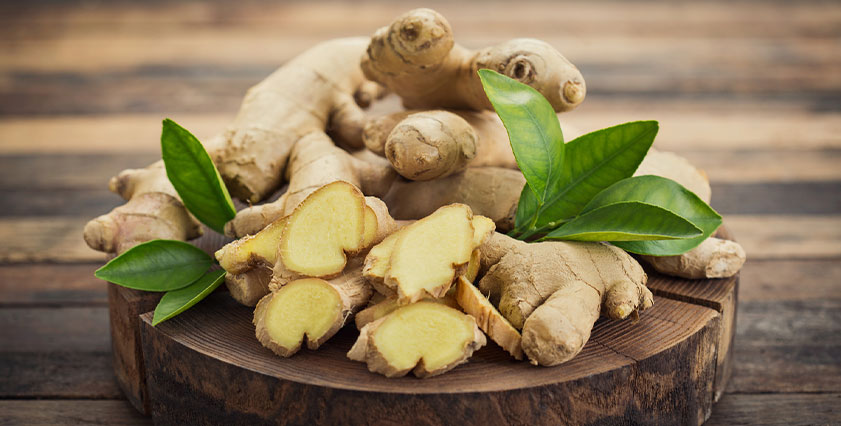15 foods that may help relieve mucus buildup

Mucus production is a healthy part of one’s respiratory system. This mucus lining in the mouth, nose, sinus, throat, and lungs is responsible for trapping dust, allergens, and viruses. However, during an infection or an allergy, phlegm or mucus can cause irritation and discomfort. People often use home remedies such as humidifiers, steam, and gargling to relieve mucus. To aid this process and alleviate symptoms, the following foods may also help:
Ginger
Ginger plays an important role in the cuisine of several cultures across the world. Due to its antihistamine content, ginger has powerful anti-inflammatory properties, often acting as a natural decongestant. It can help relieve mucus and reduce infections of the upper respiratory tract. For best results, try fresh ginger root. Boil it in some water to make ginger tea, or slice or grate it into smoothies or juices for an additional flavor and immunity boost.
Cayenne pepper
Cayenne pepper (and other spicy peppers) are a rich source of capsaicin. This can help reduce cough and mucus buildup in the body. To consume it, simply add one pinch of cayenne pepper to soup or broth. However, those experiencing acid reflux or other digestive ailments must avoid spicy foods as they may worsen inflammation.
Garlic
Garlic has been used in traditional healing practices for centuries. The main active component in garlic, allicin, is a powerful antiviral, antifungal, and anti-bacterial, playing a pivotal role in reducing phlegm buildup. Chop or mince a clove or two to add to food, or make a delicious slice of garlic toast by topping a slice of sourdough toast with olive oil and chopped raw garlic, salt, and other herbs.
Pineapple
Pineapple contains the enzyme bromelain, which has anti-inflammatory and mucolytic properties. This can be fruitful in reducing sinus pain, swelling, and mucus buildup. Additionally, pineapple is also a rich source of vitamin C and magnesium, which can help enhance immune function.
Onion
Onions are packed with the flavonoid quercetin, which can help reduce inflammation and improve respiratory function. It can also help fight allergic responses, reducing the risk of phlegm or mucus buildup in the body. Whether raw or cooked, onions can easily be incorporated into one’s meals as part of a salad, roast, or stew.
Salmon
Salmon and some other fatty fish (like herring and sardines) contain omega-3 fatty acids, a form of unsaturated fats. These may reduce inflammation in the body, helping combat phlegm buildup. It is important to note that while fatty fish like tuna and mackerel are also sources of omega-3, studies suggest that they may encourage phlegm production. For plant-based eaters who may want to look for alternative sources of omega-3, walnuts are a great option. In addition to essential fatty acids, walnuts also contain vitamins E and B6, copper, and folate, which may help boost overall immunity.
Pumpkin seeds
Pumpkin seeds are another plant-based source of omega-3 fatty acids, which may help reduce inflammation. They also contain magnesium, which can help relax blood vessels. These factors may help reduce swelling and relieve mucus congestion.
Chamomile tea
A hot cup of chamomile tea may also be helpful when dealing with nasal congestion. Chamomile contains flavonoids, which have anti-inflammatory properties. Additionally, hot liquids have been a popular household remedy for colds and infections as they may help soothe the nasal pathways and thin out mucus.
Citrus fruits
Citrus fruits are an excellent source of vitamin C, which can enhance immune function. Lemons, limes, and oranges can be consumed as is, as a juice, or added to a smoothie. Grapefruit may be especially beneficial to some as it contains salicylic acid, which is a powerful anti-inflammatory. The pH level of grapefruit may also help break down the proteins in mucus, relieving nasal congestion and clearing the airways.
Coconut water
Mucus formation is often linked to colds and coughs, which can lead to dehydration in the body. Replenishing the body’s fluid supply with coconut water may help. Coconut water also contains glucose and electrolytes, which can provide energy to the body to fight the infection.
Honey
Filtered, irritant-free honey can also be useful when dealing with nasal congestion and mucus. Honey naturally has anti-inflammatory properties, which can help reduce inflammation and swelling, relieving mucus. It can be consumed by the spoonful, or added to tea, pancakes, salads, or toast.
Bananas
Bananas are known to be easy to digest. They are also a good source of nutrients for those with a diminished appetite due to illness. In addition to potassium, they also contain fructans, which have antiviral properties and can enhance immunity. Eat them as is, add them to a smoothie, or dip them in chocolate and freeze them on sticks for a delightful frozen treat.
Kale
The superfood kale is packed with nutrients such as vitamins A, B6, C, K, folate, fiber, carotenoids, and manganese. These help boost immune function and reduce the risk of nasal congestion due to mucus. Add kale leaves to smoothies or salads, or crisp them up in the oven to make kale chips.
Turmeric
Turmeric’s main active compound, curcumin, has anti-inflammatory properties. It is an important part of many alternative treatments worldwide. To amplify turmeric’s antioxidant effects, one must combine it with a pinch of black pepper. This can be added to soup, broth, cooked vegetables, smoothies, or salads.
Water
Staying hydrated is key when dealing with a mucus or sinus infection. Water is one of the best hydrating liquids as it can help thin out and relieve mucus. Additionally, infections are often accompanied by a sore throat, and water may help pacify the same and reduce the dry, itchy feeling. Water, tea, soup, and broth are ideal to help one stay hydrated.
Avoid consuming caffeinated and sugar-laden beverages as these can worsen inflammation. Other inflammatory foods to avoid include histamine-rich products (cheese, sausage, anchovies, processed meats) and dairy products (such as milk and yogurt), as they may increase mucus production.



